|
|
|
Sort Order |
|
|
|
Items / Page
|
|
|
|
|
|
|
| Srl | Item |
| 1 |
ID:
107855
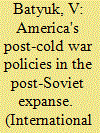

|
|
|
| 2 |
ID:
099186
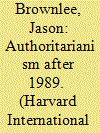

|
|
|
| 3 |
ID:
087004
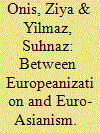

|
|
|
|
|
| Publication |
2009.
|
| Summary/Abstract |
Focusing on Turkish foreign policy in the post-Cold War era, this paper argues that the period can be divided into three distinct phases: an initial wave of foreign policy activism in the immediate post-Cold War context; a new or second wave of foreign policy activism during the Justice and Development Party (Adalet ve Kalk?nma Partisi, AKP) government era with a strong emphasis on Europeanization; and the more recent tension between Europeanization and Euro-Asianism. This paper argues that during the AKP era Turkey maintained considerable continuity in terms of foreign policy activism and a multilateral approach to policymaking. Yet at the same time, a certain discontinuity or rupture can be identified starting in the middle of the first AKP government's reign, signifying a shift from a commitment to deep Europeanization to loose Europeanization along with a parallel shift to a soft Euro-Asianism. Ultimately, the interaction between an intricate set of priorities on the domestic and international fronts will determine the future path of Turkish foreign policy.
|
|
|
|
|
|
|
|
|
|
|
|
|
|
|
|
| 4 |
ID:
087006
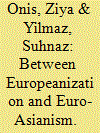

|
|
|
|
|
| Publication |
2009.
|
| Summary/Abstract |
Focusing on Turkish foreign policy in the post-Cold War era, this paper argues that the period can be divided into three distinct phases: an initial wave of foreign policy activism in the immediate post-Cold War context; a new or second wave of foreign policy activism during the Justice and Development Party (Adalet ve Kalk?nma Partisi, AKP) government era with a strong emphasis on Europeanization; and the more recent tension between Europeanization and Euro-Asianism. This paper argues that during the AKP era Turkey maintained considerable continuity in terms of foreign policy activism and a multilateral approach to policymaking. Yet at the same time, a certain discontinuity or rupture can be identified starting in the middle of the first AKP government's reign, signifying a shift from a commitment to deep Europeanization to loose Europeanization along with a parallel shift to a soft Euro-Asianism. Ultimately, the interaction between an intricate set of priorities on the domestic and international fronts will determine the future path of Turkish foreign policy.
|
|
|
|
|
|
|
|
|
|
|
|
|
|
|
|
| 5 |
ID:
151550
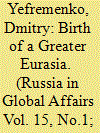

|
|
|
|
|
| Summary/Abstract |
Nearly twenty-five years separate two symbolic coincidences, each of which caused tectonic shifts in world politics. On December 8, 1991, a treaty signed in Belovezhye, Belarus, put an end to the Soviet Union; the following day the leaders of twelve Western European countries approved the Maastricht Treaty. On June 23, 2016, a majority of voters in the United Kingdom chose to leave the European Union. Around the same time India and Pakistan signed memorandums in Tashkent, Uzbekistan, to join the conventions of the Shanghai Cooperation Organization, thus bringing its membership to almost a half of the world's population.
|
|
|
|
|
|
|
|
|
|
|
|
|
|
|
|
| 6 |
ID:
188641
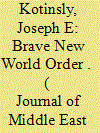

|
|
|
|
|
| Summary/Abstract |
This article uses the history of the Supreme Council for Islamic Revolution in Iraq, the largest Shī‘ī Islamist organization within the exiled Iraqi opposition movement, as a case study to delineate how the meaning, function, and salience of sectarian identities are affected by political and social changes at the local, regional, and international level. To this end, this work identifies and explains a discursive shift observed in SCIRI’s publications produced during its tenure as an Iraqi opposition group. Whereas SCIRI’s publications during the Iran-Iraq War emphasized that its brand of Islamic government would represent all Iraqis regardless of their religious or ethnic affiliation, following the war’s conclusion the Council strove to portray its leaders as the primary defenders of Shī‘ī interests in Iraq and focused near exclusively on the need to protect the rights of Iraq Shī‘ī. It argues that several key developments account for the Supreme Council’s adoption of a Shī‘ī-centric political stance during the 1990s, namely: the internationalization and unification of the Iraqi opposition movement in the aftermath of the 1991 March Uprisings and the post-Cold War environment within which the exiled Iraqi opposition was operating. When considered collectively, beyond demonstrating the contingency and complexity of the advent of Shī‘ī identity politics within Iraqi opposition circles throughout the 1990s, these findings suggest the importance of taking into consideration larger, global trends as contributing factors when conceptualizing how subnational forms of identification acquire heighted social and political salience.
|
|
|
|
|
|
|
|
|
|
|
|
|
|
|
|
| 7 |
ID:
099447
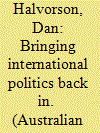

|
|
|
|
|
| Publication |
2010.
|
| Summary/Abstract |
This article argues that the failed-state phenomenon is not unique to the post-cold war era, nor is it uniquely threatening in comparison with other historical periods. The article contends that state failure is not primarily a failure of formal institutions of governance but a subjective condition defined by the great powers. 'Bringing international politics back in' is essential to a clear understanding of the issue for an emerging multipolar international system of the twenty-first century. The article draws on classical realist and critical constructivist perspectives to define state failure before developing a theoretical framework to reconceptualise the issue in a historical and international systemic context. Interpretations of state failure are based on the interplay of contingent transnational threats with the distribution of capabilities in the international system, the pattern of order in the international society, and the sensitivity of the domestic polities of leading actors to risk. The article draws some implications of this for the coming decades of the twenty-first century.
|
|
|
|
|
|
|
|
|
|
|
|
|
|
|
|
| 8 |
ID:
129713
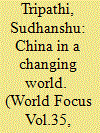

|
|
|
|
|
| Publication |
2014.
|
| Summary/Abstract |
With the recent change in the erstwhile leadership in China, the new leader President Xi Jinping has elucidated his vision as the "China Dream", Which sets out a new package of reforms on the anvil with a view to ensure economic progress matching with its rising population and their so rising aspirations and expectations, besides enlarging its sphere of influence in its vicinity and also in far flung areas of the world in its all-out efforts to not only maintain its regional predominance but also to achieve a big leap forward so as to be recognized as a dominant and responsible player in international relations against its long held desire to proceed toward assuming the role of a global hegemony next only to the US through replacing the US must be its ultimate goal hidden under the cloak of its economic-militaristic aggressions which is witnessed in its aggressive imperialist policies all over the world as it has not yet overcome from its age-old middle Kingdom complex.
|
|
|
|
|
|
|
|
|
|
|
|
|
|
|
|
| 9 |
ID:
094084
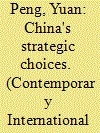

|
|
|
| 10 |
ID:
132526
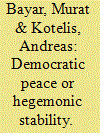

|
|
|
|
|
| Publication |
2014.
|
| Summary/Abstract |
Democratic peace theory (DPT) and hegemonic stability theory provide different explanations for cooperation among (democratic) states. The Imia/Kardak crisis took place between Greece and Turkey, two democratic, nonnuclear, and interdependent states in the post-Cold War era, thus, offers rare insights into these theorized processes. During this crisis, democratic actors and issues contributed to escalation, whereas war was prevented in the last minute by the coercive diplomacy of the USA. Based on our archival research in Greece and Turkey, our findings pose a challenge to the validity of the DPT for democratic dyads with territorial conflicts.
|
|
|
|
|
|
|
|
|
|
|
|
|
|
|
|
| 11 |
ID:
086942
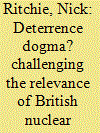

|
|
|
|
|
| Publication |
2009.
|
| Summary/Abstract |
In December 2006 the British government released a White Paper announcing its intention to begin the process of replacing its current Trident nuclear weapons system, thereby allowing it to retain nuclear weapons well into the 2050s. In March 2008 the government released its National Security Strategy that stressed the long-term complexity, diversity and interdependence of threats to British security with a clear focus on human rights, justice and freedom. This article asks how the threat to kill tens if not hundreds of thousands of people with British nuclear weapons fits into the National Security Strategy's world view and questions the relevance of an instrument of such devastating bluntness to threats defined by complexity and interdependence. It argues that the government's case for replacing the current Trident system based on the logic of nuclear deterrence is flawed. First, Britain faces no strategic nuclear threats and the long-term post-Cold War trend in relations with Russia and China-the two nuclear-armed major powers that could conceivably threaten the UK with nuclear attack-is positive, despite current tensions with Moscow over Georgia. Second, the credibility and legitimacy of threatening nuclear destruction in response to the use of WMD by 'rogue' states is highly questionable and British nuclear threats offer no 'insurance' or guarantee of protection against future 'rogue' nuclear threats. Third, nuclear weapons have no role to play in deterring acts of nuclear terrorism whether state-sponsored or not. Fourth, British nuclear threats will be useless in dealing with complex future conflicts characterized by 'hybrid' wars and diverse and interdependent sources of insecurity. The article concludes by arguing that the government's fall-back position that it must keep nuclear weapons 'just in case' because the future security environment appears so uncertain, makes no sense if British nuclear threats offer no solution to the causes and symptoms of that uncertainty.
|
|
|
|
|
|
|
|
|
|
|
|
|
|
|
|
| 12 |
ID:
174616
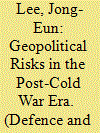

|
|
|
|
|
| Summary/Abstract |
This study explores the post-Cold War era by investigating geopolitical risks (GPRs) from the Middle East to the Korean Peninsula. Geopolitics is a fleeting reality and is a matter of a few top decision makers while ordinary people catch a glimpse of it by the press. Due to the relative inaccessibility of key information, geopolitics is hard to study even if it is a crucial element to shape our era. To fill the gap, we adopt a copula approach to surmise a joint probability distribution between the GPR in the world and several countries. This method could capture tail dependence. The highest upper tail dependence with the world’s GPR has been that of Israel; as one moves from the Cold War to the post-Cold War period, the increasing cases of upper tail dependence are China, Korea, Russia, and Ukraine while decreasing cases are Israel, Saudi Arabia, and Turkey. It implies that the world’s flashpoints might have been shifting from the Middle East to Asia as our eras have gone through the Cold War and the post-Cold War periods. Seemingly self-centered Make America Great Again could be Make the World Great Again. The best is yet to come.
|
|
|
|
|
|
|
|
|
|
|
|
|
|
|
|
| 13 |
ID:
109310
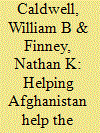

|
|
|
| 14 |
ID:
166831
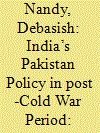

|
|
|
|
|
| Summary/Abstract |
The crux of Indo-Pak relations is confined within hard diplomacy. The arms race and process of militarization have vehemently affected bilateral relations between the Stwo neighbours. When a relationship starts with antagonism, then it might hardly transform into friendship. Both countries are federal with plural society. While Pakistan is the worst example of pluralism, India is a classic example of pluralistic idea. Regarding multiculturalism and communal tolerance, India’s perception is different from Pakistan. Pakistan had built up close ties with Islamic states, which has a dual purpose to seek an Islamic identity on one hand and obtain economic assistance on the other. It is in this context, this paper will try to examine India’s policy towards Pakistan, especially during Narendra Modi’s first tenure as Prime Minister and the role of external powers in Indo-Pak relations.
|
|
|
|
|
|
|
|
|
|
|
|
|
|
|
|
| 15 |
ID:
046389
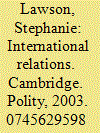

|
|
|
|
|
| Publication |
Cambridge, Polity, 2003.
|
| Description |
viii, 160p.
|
| Standard Number |
0745629598
|
|
|
|
|
|
|
|
|
|
|
|
Copies: C:1/I:0,R:0,Q:0
Circulation
| Accession# | Call# | Current Location | Status | Policy | Location |
| 046495 | 327/LAW 046495 | Main | On Shelf | General | |
|
|
|
|
| 16 |
ID:
127053
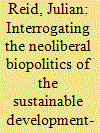

|
|
|
|
|
| Publication |
2013.
|
| Summary/Abstract |
One of the defining features of post-Cold War international relations has been the correlation of development practices and rationalities with those of security, and the emergence of what has been called the "development-security nexus." While the development-security nexus remains relevant, semantic shifts in the conceptualization of both development and security are occurring. Demands for development are increasingly tied not simply to demands for "security," but to a discursively new object of "resilience." And this shift from security to resilience is likewise tied to a reconceptualization of development as "sustainable development." Are these, then, merely semantic shifts, or do they signify changes in the rationalities that have shaped the "development-security nexus" during the post-Cold War period? Are the rationalities that distinguish resilience different to those underpinning demands for security? And are those of "sustainable development" different to what was once known simply as "development"? Does the weaving of a nexus of relations between "sustainable development" and "resilience" represent a departure from the "development-security nexus" in some way? And, if so, what explains that shift and what are its political implications? This article answers these questions through an analysis of the neoliberal biopolitics of the "sustainable development-resilience nexus." While sustainable development deploys ecological reason to argue for the need to secure the life of the biosphere, neoliberalism prescribes economy as the very means of that security. Economic reason is conceived within neoliberalism as a servant of ecological reason, claiming to secure life from economy through a promotion of the capacities of life for economy. This is the paradoxical foundation on which neoliberalism constructs its appropriation of sustainable development. Sustainable development and neoliberalism are not the same, nor is the former simply a proxy of the latter, but they do come into contact powerfully on the terrain of their rationalities of security which, on account of the interplay between ecological and economic reason, is increasingly conceptualized as resilience. This surface of contact ought to make for a tense and political field of contestation, but has instead made largely for a strategically manipulable relation between the two doctrines.
|
|
|
|
|
|
|
|
|
|
|
|
|
|
|
|
| 17 |
ID:
091053
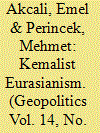

|
|
|
|
|
| Publication |
2009.
|
| Summary/Abstract |
Over the past decade or so, there has been a convergence between the Eurasianist and Kemalist ideologies in Turkey. A number of Kemalist and Socialist intellectual and political actors together with sections of the military have started to articulate Eurasianism (Avrasyac?l?k in Turkish) as a new geopolitical discourse for Turkey and as an alternative to Turkey's pro-Western foreign policy orientation. In this perspective, Eurasianism stands for a political, economic and cultural alliance with 'Eurasian countries', such as Russia, Iran, and Turkic countries in Central Asia, as well as Pakistan, India and China. This article aims to deepen the analyses carried out thus far on this emerging geopolitical discourse. To this end, it contextualises the emergence of the Eurasianism in Turkey within the wider social, political and historical context of which it forms a part, including the framework of asymmetrical political and economic relations that developed between Turkey and its Western allies in the post-Cold War period.
|
|
|
|
|
|
|
|
|
|
|
|
|
|
|
|
| 18 |
ID:
094317
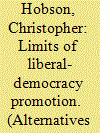

|
|
|
|
|
| Publication |
2009.
|
| Summary/Abstract |
One of the few unambiguously positive outcomes of the George W. Bush years is a greater interest in the practice of democracy promotion. However, the expansion of scholarship in this area has not been matched by an equal expansion in its scope. There continues to be an overwhelming tendency to focus exclusively on empirical case studies and policy prescriptions, usually informed by a set of unstated liberal assumptions. Nothing is necessarily wrong with this per se. The problem stems from the lack of attention directed toward the larger theoretical and conceptual frameworks that inform and shape these practices. Responding to this state of affairs, this article examines the way certain theoretical tendencies and commitments have helped give rise to many problematic aspects of liberal democracy promotion. It is necessary to challenge the restrictive framework that currently dominates. It is argued that to do so entails rethinking, extending, and pluralizing the way democracy itself is conceived.
|
|
|
|
|
|
|
|
|
|
|
|
|
|
|
|
| 19 |
ID:
100350
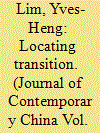

|
|
|
|
|
| Publication |
2010.
|
| Summary/Abstract |
In charting the water of the post-Cold War world, one of the most prominent questions touches upon the likely effects of China's rise. Echoing more or less explicitly power transition theory's assumptions, the rapid and multifaceted ascent of China has popularized the idea of a likely overtaking of the American dominant power by the rising challenger. Sceptics have, however, pointed out that by most standards China remains far from being on a par with the United States. This paper argues that though a global power transition lies far beyond the horizon, the relevant level at which the transition should be considered is the East Asian region, or the Asian 'super-region'.
|
|
|
|
|
|
|
|
|
|
|
|
|
|
|
|
| 20 |
ID:
018416
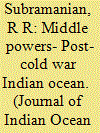

|
|
|
|
|
| Publication |
Dec 2000.
|
| Description |
228-236
|
|
|
|
|
|
|
|
|
|
|
|
|
|
|
|
|
|
|
|
|